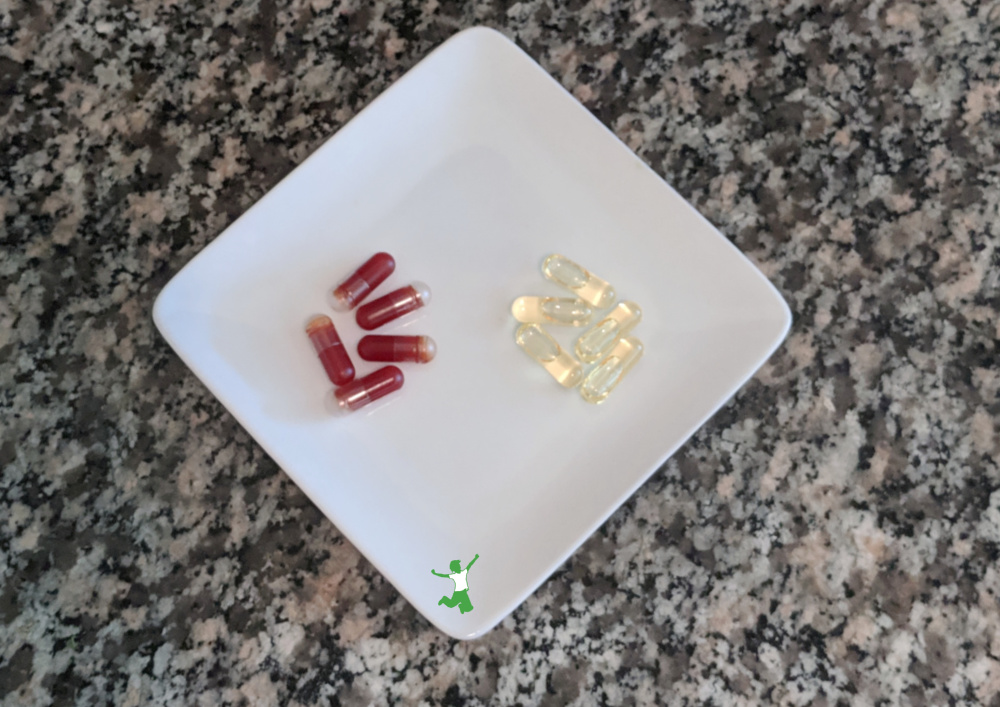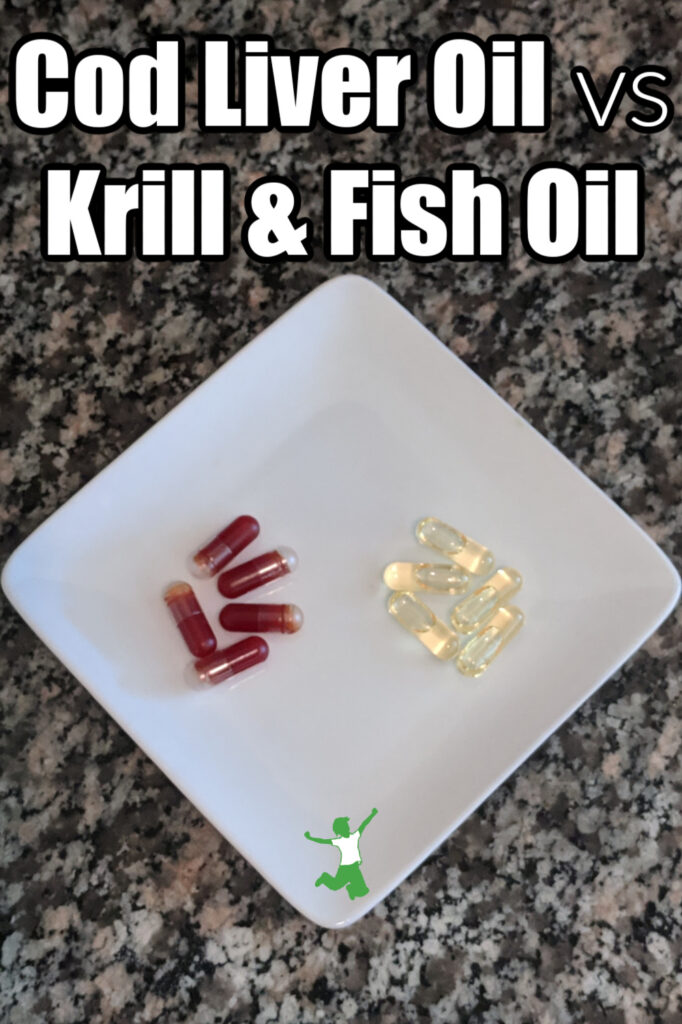Comparison of krill oil to cod liver, fish, and other marine oils in nutritional value, omega-3 fatty acids, and fat-soluble vitamins A and D.

Every ocean on planet Earth contains an abundance of tiny animals known as krill. Measuring only about two inches in size, they are uniquely positioned at the base of the food chain along with other organisms such as zooplankton, sardines, and minnows.
Thousands of diverse animal species rely on krill for food including birds, fish, and whales.
In recent years, supplements derived from these creatures, most notably krill oil, have enjoyed a surge in popularity sometimes as an alternative to fish oil or fish liver oils.
Is such a substitution wise? Does krill oil offer benefits not found in other marine oils?
Let’s see what the research says.
What is Krill Oil?
Krill oil is an omega-3 fatty acid-rich macronutrient derived from processing ocean-based krill.
The word “krill” derives from the Norwegian language. It literally means “small fry of fish”, which is technically inaccurate because krill are invertebrate members of the large arthropod subphylum, Crustacea.
To date, approximately 85 species of krill are known to scientists. They congregate together in large swarms that at certain times of year are even visible from space! (1)
Nutritional Benefits
Being at the bottom of the food web means that krill have a much lower probability of contamination from pollution, hence their popularity in supplements such as krill oil.
In addition, many species favor colder waters that tend to be more pristine though this is not always the case.
Superior Omega-3 Fatty Acids
Pure krill oil is an excellent source of the long-chain omega-3s fatty acids EPA (eicosapentaenoic acid) and DHA (docosahexaenoic acid).
Unlike short-chain plant-based omega-3 fats found in foods like flax, chia, canola, and hemp seed, long-chain omega-3 fats require no conversion by the body and can be immediately utilized.
This plant-based precursor (alpha-linolenic acid – ALA), while essential in and of itself, has a very low rate of conversion to EPA and DHA. The process is similar to the poor conversion of beta carotene in vegetables to true Vitamin A.
In those with gut issues, the conversion may not take place at all.
Hence, a person cannot consume enough plant-based omega-3 to achieve healthy levels of EPA and DHA. (2)
Plant-based eaters take note!
For these reasons, the omega-3 fats in krill oil are superior to those found in plant foods.
Phospholipids
Most of the omega-3 fats in krill oil are in phospholipid form. This is different from the pure triglyceride form of omega-3 fats found in fish oil or raw cod liver oil.
Research suggests that phospholipid omega-3 fats are particularly beneficial to human biology and even preferable to the triglyceride form. (3)
Why?
The presence of phospholipids allows the transport of omega-3 fats by the blood to where they are needed most. This enhanced mobility increases absorptive potential dramatically, perhaps by as much as 10-15 times. (4)
Phospholipid fatty acids represent key structural components of our cells. These important fats play a vital role in cell membrane functioning, which in turn positively affects the overall functioning of our tissues and organs.
Vitamins A & D
Most sources suggest that krill oil is devoid of Vitamins A and D. However, this is not entirely true.
Some quality sources of krill oil (such as this one) contain approximately 100 IU of natural Vitamin A per gram. While small compared to fish liver oils, it is still present.
Krill oil does not naturally contain any other fat-soluble vitamins including Vitamin D, E, or K2 (unless added by the supplement manufacturer).
Astaxanthin
Astaxanthin is a naturally occurring carotenoid. It is especially plentiful in zooplankton and krill which accumulate it in their bodies by consuming phytoplankton.
This powerful substance has 550 times the antioxidant strength of vitamin E and 6000 times that of natural Vitamin C.
Astaxanthin promotes skin health, endurance, and immune support in humans. It also supports eye health and reduces inflammation by reducing free radical activity. (5)
Krill oil is a natural source of astaxanthin albeit at low levels.
Is Krill Oil Sustainable?
Despite their tiny size, krill can live a very long time…up to 10 years!
This surprising fact combined with their astronomically large numbers does not mean that sustainability and method of harvesting aren’t an issue, however.
Be sure that the source you choose utilizes eco-harvesting methods to prevent the death of non-krill species (I suggest this vetted brand).
It is also important to choose a krill oil that is produced using ecologically sound methods.
For example, extraction of oil must not involve solvents in the manufacturing process as these substances are not only carcinogenic but also highly polluting to the environment.
Now that we’ve reviewed the benefits of krill oil, let’s make some conclusions.
Krill versus Plain Fish Oil
Without a doubt, krill oil is a far better choice than fish oil as an omega-3 supplement.
The omega-3 fatty acids from krill are primarily in phospholipid form, which is more potent and better absorbed than the triglyceride form found in fish oil. (3)
Secondly, krill oil contains small amounts of astaxanthin, a strong anti-oxidant. This protects it from oxidation better than fish oil, which contains none.
A case could also be made that krill oil is a more sustainable source of marine-based omega-3 fats than fish oil.
This is because a tiny amount – around 1-2% – of the total krill biomass is harvested each year. This process is
On the other hand, the overfishing of species used to produce fish oil is a much more serious and unregulated problem worldwide.
What About Cod Liver Oil?
While the case for krill oil over fish oil is cut and dry, the comparison is less clear for cod liver oil.
Here is a review of the Dropi brand, which is what our family has used since 2015.
When it comes to cod liver oil, most brands should definitely be avoided. They are highly processed and contain Vitamins A and D that are either synthetic and/or are not in their natural ratios.
Virgin fish liver oils are another matter entirely.
This beneficial supplement contains Vitamins A and D in the proper synergistic ratio in an unheated, optimally bioavailable form.
I suggest this brand and this brand as quality sources to consider.
Thus, if you are seeking a natural source of natural Vitamins A and D, unheated virgin fish liver oils are definitely your best bet over krill oil.
With regard to omega-3 fats, both fish liver oils and krill oil contain them. However, the phospholipids in krill oil are not present in fish liver oil.
In other words, from an omega-3 perspective, krill oil is a better choice than fish liver oils.
Best Marine Oil
In conclusion, research suggests skipping the fish oil entirely and choosing either virgin fish liver oil or krill oil.
Need a marine oil supplement primarily for omega-3 fatty acids? If so, choose sustainable krill oil (this is my preferred source) as it offers phospholipids, the most beneficial form.
If you do not consume organ meats in your diet and thus need marine oil as a natural source of true Vitamin A and D, choose raw virgin cod liver oil (I recommend this brand and this brand).
The best way to go is to have both in your pantry, food budget permitting.
If you can only afford one, choose virgin cod liver oil as it contains both Vitamins A/D and omega-3 fats (albeit not in the more potent state).
Allergic to Fish or Shellfish?
For those who are allergic to fish or shellfish and cannot easily tolerate marine oils in the diet, I suggest considering these alternatives to cod liver oil.

References
(1) Krill Oil: Make this Omega-3 Supplement Part of Your Health Regimen
(2) Omega-3 Fats from Plants vs Animals
(3) Overview of Omega-3 Fatty Acid Therapies
(4) Invertebrates: Visual Atlas of Science
(5) Astaxanthin: Sources, Extraction, Stability, Biological Activities, and Its Commercial Applications—A Review








There are always opposing viewpoints. After years of following a WAPF-style diet, I’ve found arguments against consuming any type of fish oil and Vitamin A and D supplements in any form to be quite compelling.
Sarah, great column as usual, especially the linked one about organ meats; I am going to get some dessicated grass-fed liver powder. One comment, however, about krill: There is no level of commercial krill fishing that is “sustainable.” Whale populations have been decimated and continue to decline; these highly intelligent creatures, who depend largely on krill, need all the help they can get. Don’t buy krill.
What about Calamari Oil? I’ve read a lot of good things about it.
I will have to look into that! Thanks for the idea.
A teaspoon of cod liver oil per day is a good habit to form. You get vitamin A and D and omega threes.
Is Dr Mercolas krill oil a good choice?
Thank you for the post. I see you recommend Dropi. Do you have an opinion on Rosita brand?
Also, I believe Dr. Price recommended the cod liver oil mixed with butter oil as a way to make the nutrients bioavailable, do you use butter oil with your cod liver oil?
I use a K2 supplement derived from natto with our cod liver oil instead of butter oil as it is more reliable as to the amount of K2 … the butter oil from Green Pastures doesn’t have an amount of K2 in the product on the label. I haven’t tried Rosita brand.
I have Dr. Caroline Dean’s raw fermented cod liver oil with butter. Is this an acceptable oil? You talked about raw and not processed. Is fermentation considered processed? Thanks
I am not familiar with that brand.
Hi Sarah,
How come you are no longer recommending Green Pasture’s CLO?
Thanks
I haven’t used Green Pastures cod liver oil in years … I switched soon after the Fukushima accident which greatly concerned me about radioactivity in fish from the Northern Pacific (which continues to pour in 24/7 even today! The problem continues to grow on a cumulative basis as Japan still hasn’t contained that nuclear power plant). In fact, I don’t eat any seafood from the Northern Pacific. https://www.thehealthyhomeeconomist.com/tuna-safe-post-fukushima/
Dropi which I’ve used for a long time is sourced from Iceland. I’ve explained this on many other posts … sorry you didn’t see it before this!
I was surprised the Cod liver oil is better than Krill alone after the build up for Krill… hmm. Isn’t there another way to supplement A and D and take the Krill?
Yes, eat organ meats 🙂 Desiccated liver is a good one if you don’t want to actually cook them. https://www.radiantlifecatalog.com/product/radiant-life-desiccated-liver/superfoods-supplements/?a=58537
isn’t cod liver too high in vitamin A anyway ? it’s easy to overdose and we already get plenty from diet alone
Natural unheated cod liver oil is not too high in Vitamin A. What you are getting from diet is primarily synthetic A from fortified foods. Remember that vitamin A from vegetables is not true Vitamin A. It is beta carotene which barely converts at all in the body to true Vitamin A. You almost certainly aren’t getting enough natural Vitamin A in your diet alone unless you are eating liver once a week.